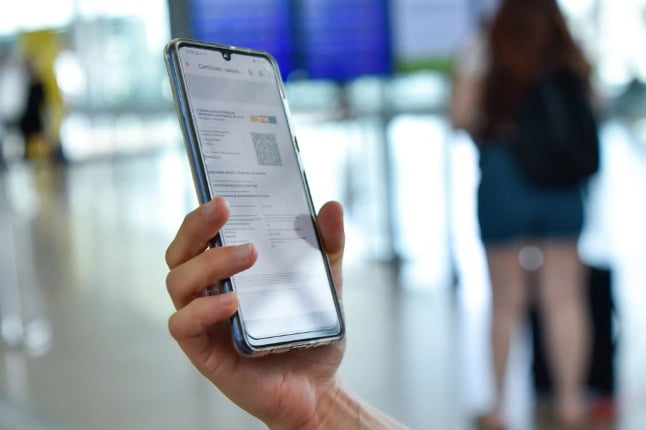Under a new decree signed by Health Minister Roberto Speranza late on Tuesday, “the ‘green pass’ will be sufficient for travellers coming from countries within the European Union” from next month.
This means arrivals from other EU countries from February will no longer need to show both proof of vaccination or recent recovery plus a negative test result.
It will also remove a requirement for unvaccinated passengers to quarantine for five days on arrival.
As cases of the Omicron variant surged in December, Italy’s health ministry brought in the current requirement for negative coronavirus tests from everyone, whether vaccinated or not, and a five-day quarantine for those who are not vaccinated – a decision which irritated Brussels.
The change to Italy’s rules was reported hours after a recommendation from the EU council, made up of member states, that countries should base their travel rules on an individual case rather than the region they are travelling from..
That would mean those with an EU health pass or certificate, which proves vaccination, recovery or a negative test would be allowed to travel freely within the EU or Schengen zone without the need for extra tests or quarantine, even if they were coming from a country with high Covid infection rates.
This refers only to international travel, and not to the domestic health or vaccine passes that many EU countries, including Italy, now require to access venues such as bars.
The recommendation is comes into force on February 1st, but it is non-binding so individual EU countries would be free to impose whatever travel restrictions they wish
The EU created its Covid-19 certificate scheme to try to ensure free movement throughout the bloc but as infections spiked again in the winter certain countries chose to reimpose extra restrictions on all travellers.
Italy’s so-called green pass shows the bearer has been vaccinated, has recently recovered from the virus, or has tested negative.
EXPLAINED: How do Italy’s Covid vaccination rules apply to visitors?
Travellers from any European member state can show their country’s version of the green pass, or health pass – which is recognised on par with Italy’s.
The Italian health ministry is set to review its travel restrictions for arrivals from other countries by February 1st. The ministry has not yet given any indications as to whether it plans to change or extend existing rules.
In addition to the health pass requirement for travel, Italy is increasingly relying on the use of its domestic green pass, proving vaccination, testing or recovery.
The country now has a two-tiered system in place, with passes required for entry to almost all venues and services in the country.
From February 1st, Italy will make its green pass mandatory for entry to most shops, and will cut the validity of domestic passes issued based on vaccination from nine to six months.
For further details about Italy’s current Covid-19 health measures please see the Italian health ministry website (available in English).




 Please whitelist us to continue reading.
Please whitelist us to continue reading.
Can anyone explain to me why Italy, a country with a very high vaccine uptake and low vaccine hesitancy, needs to coerce it’s people with these measures? What is the real motivation? I need to vaccinate my 12 year old son from an illness that poses him almost zero risk in order for him to continue his swimming lessons? That’s an outrage, why don’t most Italian people see this? Why isn’t anyone asking the questions of the benefit of these vaccine mandates?
Firstly; vaccination rates are already very high in Italy – so why do we need to coerce people?
Secondly; infection rates, hospitalizations and death data in Italy is comparable of worse (per capita) than countries such as the UK who have zero vaccine pass program. So what is the real purpose?
Will this be extended to apply to UK travellers?
Why would it?
Why would it? Maybe because UK visitors for both tourism and business are a massive source of revenue for the Italian state Tommy. They did the same last year after a little bit of time, recognizing the NHS vaccine QR code as adequate proof on par with the EU code.
It’s an EU wide recommendation, not just Italian. The UK is a 3rd country now – it doesn’t deserve special treatment over others.
What about people coming from the UK?
I have a 3 month trip to Rome booked for March, will I still need additional tests to enter Italy? My vaccination status will last to mid June, following the 6 month new rule from 1st February.
Beverley
Yes, you need to be tested before arrival – it can be a LF.
My wife and friends are booked to visit Italy in April. Being a mix of NHS staff and care workers they all got boosters in October. The 6 month ruling means their NHS covid passports will be invalid in April. The potential impact of this on visitors from Uk means many won’t be eligible for green pass and will go elsewhere. Wife now looking at Greece and Spain alternatives. Big impact on Italian tourism industry I suspect.